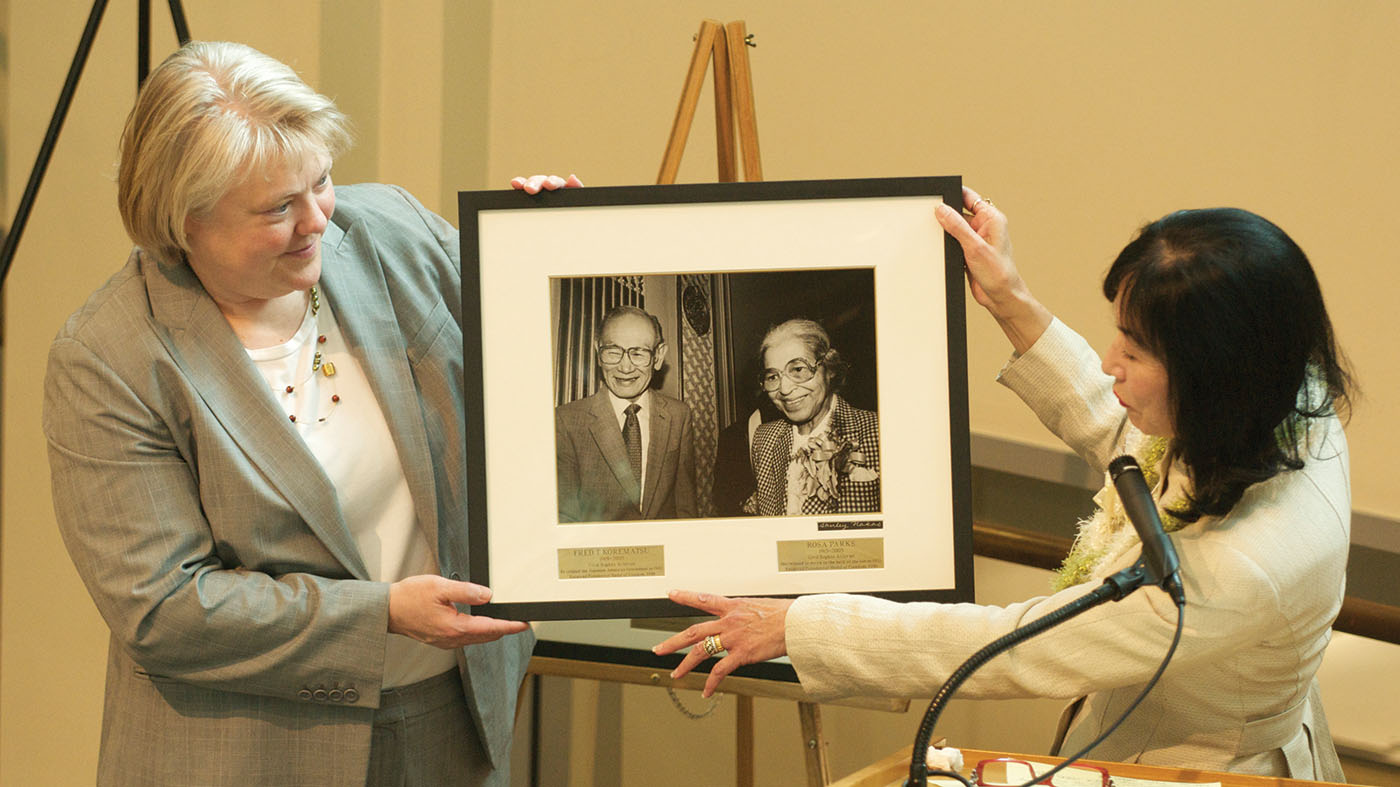
Reaching for Justice

In the early 1990s, as a rookie professor teaching my first class at the University of Puget Sound School of Law, I found myself helping a distraught student who had a leasing dispute with her landlord.
That student was Dana Gold ’95, and it was the beginning of a collaboration for justice that would catalyze significant change for the law school. That year, we revitalized the school’s Public Interest Law Foundation (PILF) – including holding the first annual auction in classroom 501 to raise funds for summer public interest fellowships (she served hot dogs and I served beer, or maybe it was vice versa!). We also began advocating for more focus in the law school’s curriculum and programs on social justice. Although at that time only the law school’s clinical program was focused on public interest law and social justice, we found many like-minded students, and some faculty and staff colleagues, eager to advance the school’s mission in this direction.
Just as this movement began, we were shocked to learn that our law school had been acquired by Seattle University. When our new university president – with a priest’s collar – was introduced, Dana and I locked eyes: here was the opening we needed. The Jesuit mission of Seattle University was deeply grounded in social justice and the imperative of solidarity with the poor. Now the administration was speaking our language! We knew that our advocacy for a greater focus on social justice was likely to be welcomed and encouraged.
Dana galvanized an energetic group of students to develop what became known as the “Platform for Promoting Public Interest Law” – a white paper with a purpose. Several faculty and staff colleagues, alumni, and community members added their support and assistance. The Platform made the case for reforming our mission, curriculum, and programs to embrace social justice and promote the public interest. As we sought to integrate with our new university sponsor, the Platform’s deep resonance with the Jesuit mission and its focus on the service of justice rang clear and true. In an otherwise chaotic time of change, advocacy for this new focus was well-organized and broadly supported.
Several initiatives grew out of the Platform. In hearing the proposal for the Access to Justice Institute (ATJI), which truly was groundbreaking in its day, then Seattle U Provost John Eshelman noted in his characteristically understated way, “Well, you may have just given me an answer for why we bought a law school.” Further, the Jesuit community, known as the “Society of Jesus” and abbreviated “SJ,” was of course delighted at the name of the new Seattle Journal for Social Justice (SJSJ). There, too, we broke new ground with an interdisciplinary approach to social justice that holds such deep promise for progress.
The enormous energy that advanced these important building blocks continued to build synergy and recruit a new generation of students, faculty, and staff to the law school, which in turn deepened its social justice identity. The Washington and King County legal communities were eager to embrace a law school that served Seattle and that was in solidarity with many justice initiatives in the region. As the school relocated to Seattle in 1999, its identity matured and its stature grew, further attracting students who sought a legal education with substantial opportunities for working in the public interest.
This momentum continued to build and sparked the creation of a Center on Corporations, Law & Society that advocated for corporate responsibility. That same momentum also later helped conceptualize and launch the Fred T. Korematsu Center for Law & Equality, which has further solidified Seattle U Law’s leadership in social justice. The Public Interest Law Foundation continued to grow, with each annual auction raising more and more funds to support students working in public interest law. Taken together, these changes helped create an environment that fosters diversity and equity, which has attracted students, faculty, and staff who understand law as a vital pathway to justice.
As it celebrates its 50th anniversary, Seattle U Law is respected nationally for its strong social justice identity and has served as an inspiring model for a community-engaged law school that advances the public interest while enhancing student education. Its alumni, who have served as leaders of law firms and businesses since the school’s founding, are now also leaders of many public service and public interest organizations. Moreover, many leaders of communities and causes that remain un- or under-represented in our legal system are Seattle U grads. In this region and beyond, Seattle U Law is truly at the heart of justice.
Kellye Testy is a former dean and professor of law at Seattle University School of Law. She is currently president and CEO of the Law School Admission Council.
Contact
David Sandler
Director, Marketing & Communications
206-398-4108
sandlerdavid@seattleu.edu
Nicole Jennings
Assistant Director, Communications & Public Relations
206-398-4175
njennings@seattleu.edu